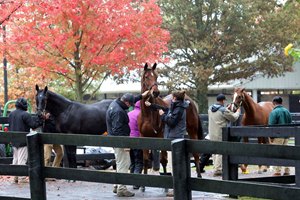Successful Fasig-Tipton Sale Closes Yearling Season


After early season disruptions due to the COVID-19 pandemic, the North American yearling sales market regained its footing and ended on a solid note with the Fasig-Tipton Kentucky October Yearlings Sale that concluded Oct. 29 with figures slightly below last year's record-setting auction.
From 1,553 head cataloged, Fasig-Tipton reported 961 yearlings sold for $32,743,700, an average price of $34,073, and a $15,000 median. The RNA rate was 21.6%. Last year, from 1,590 cataloged, Fasig-Tipton reported 1,008 horses averaged a record $37,955 from record gross receipts of $38,258,900, with a median price of $13,000.
This year's sale topper was a son of Uncle Mo purchased by Karl and Cathi Glassman, with Donato Lanni acting as agent, for $600,000. Consigned by Lane's End, agent, as Hip 1131, the colt bred in Kentucky by Kinsman Farm was a $325,000 buyback at the Keeneland September Yearling Sale. Produced from the winning A.P. Indy mare A. P. Dream, the colt is a half brother to stakes winner and multiple group-placed Wind Fire.
"All in all, I think it has to be considered a successful week," said Fasig-Tipton president Boyd Browning Jr. "It was a legitimate market for four days. Buyers trying to buy what were perceived to be the better quality horses thought it was very difficult to buy, with lots of competition for those horses. We are not going to sit here and say everything is lovely and the world is great. Anytime a sale has a median of $15,000, with the economics of raising a yearling, meant there were a lot of unprofitable yearlings. But I think that has been the case for a number of years. We play a game of high-risk, high-reward sometimes.

"It was pretty doggone good the last four days, under the circumstances. It felt very similar to last year."
Browning said the vibrant market at the yearling sales was indicative of the desire by owners to chase the dream of having horses that win at the highest levels.
"The resiliency of the men and women who participate in the Thoroughbred industry amazes me," Browning said. "You have to be tough to participate in this game. We all live a dream. We all want to breed a (Kentucky) Derby winner, a (Kentucky) Oaks winner, or a grade 1 winner. The dream is alive even in the COVID year of 2020. I think we are pleased and relieved with 2020."
Like most other North American auctions, the October sale was conducted with COVID-19 protocols in place, including limited seating in the sale pavilion, temperature and health screening for those entering the sale grounds, and mask use and social distancing throughout the facility.
For those unable and unwilling to attend the sale in person, Fasig-Tipton made extensive use of telephone and internet bidding options.

Browning said that over the four-day auction, 76 horses were sold via internet bidding for receipts of approximately $2.5 million.
"They were kind of at the average price for the overall sale, which I guess shows there was internet participation from less-expensive horses to six-figure horses, so it kind of represented the diversity of the sale," Browning said.
Though the numbers were down from last year, considering the uncertainty on which the yearling sales began, the results were deemed a positive for the industry.
The traditional yearling sales calendar was upended with the cancellation of three Fasig-Tipton sales—The July Sale, the Kentucky selected yearling sale; The Saratoga Sale, the selected yearling sale in Saratoga Springs, N.Y.; and the New York Bred Yearlings Sale also in Saratoga—that traditionally kick off the yearling sale season.
Fasig-Tipton added a one-time Selected Yearlings Showcase to the calendar in September during the week following the Kentucky Derby Presented by Woodford Reserve (G1) to somewhat fill the void, and that was followed by the lengthy Keeneland September Yearling Sale.
"I think it's amazing and just shows you how resilient we are," prominent bloodstock agent Mike Ryan said of how the market held up in the face of uncertainty. "It has been remarkable. The uncertainty was unnerving."
In addition to the bloodstock market disruptions, most North American racing was idled through midsummer, resulting in rescheduling of the Triple Crown series.
Ryan said a key to a resurgent bloodstock market was the resumption of racing, albeit for the most part without fans in attendance.
"Thank God racing resumed back in May because it's the engine that drives everything," Ryan said. "Without racing, we're nothing. Purses have gone back up in New York to pre-COVID-19 levels."
"This sale has been a very good sale for any kind of clean horse with above average physical conformation," said consignor Reiley McDonald of Eaton Sales. "It's incredible. Who knew where we'd even be by October of this year. We don't know what's happening next year with racing, the sales market, or the industry in general, yet this sale was on par with last year, which is hard to believe."
The market reflected a continuation of the polarization seen in all public auctions over the past several years, with horses that met all the criteria of buyers selling beyond expectations.
"Sadly, there are a lot of lower-end horses that it's a very tough market for," McDonald said.
"It's very polarized," Ryan said of the overall market. "People aren't going to pay you for average stock. If they like your horse, you will be rewarded. We just don't have enough people that want to race a horse, that want to pay $120 a day (trainer fees) to run one. There are not enough end-users."
